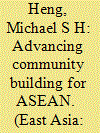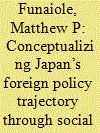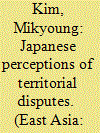|
|
|
Sort Order |
|
|
|
Items / Page
|
|
|
|
|
|
|
| Srl | Item |
| 1 |
ID:
145146


|
|
|
|
|
| Summary/Abstract |
This is a policy paper supporting the vision of ASEAN leaders in the project of ASEAN Community building. However, it goes beyond their declarations to argue for a more thorough going adoption of the norms of the United Nations and to promote more people-to-people activities and ASEAN consciousness among the people. ASEAN was established in 1967 with the aim to strengthen regional cooperation to deal with the geopolitical challenges of the Cold War. It has scored successes in the realm of economy. Driven by the dynamics of globalization, ASEAN has aspired to become a full-fledged community of nations. It aims to widen its scope to include social and cultural dimensions, social justice, and human rights. The most progressive manifestation of this is the ASEAN Charter. To advance the project of the ASEAN Community, this paper makes suggestions at two levels, namely the level of ideas and the level of activities, with some reflections on nation building. A nation at peace with itself based on social justice and human rights contributes to regional community building. If and when it does come about, the ASEAN Community will represent a new ASEAN identity, with a new moral and political order, and it will be able to articulate global issues in international forums with moral authority and moral coherence.
|
|
|
|
|
|
|
|
|
|
|
|
|
|
|
|
| 2 |
ID:
145143


|
|
|
|
|
| Summary/Abstract |
Regional security studies of the Asia-Pacific commonly center upon China’s rise, leaving other actors underresearched. Among these is Japan, whose ongoing reinterpretation of its pacifist constitution may destabilize the region. This article employs Social Identity Theory, a social psychology theory of group behavior, to develop a unique framework that accounts for both the domestic and international constraints acting upon Japan’s foreign policy makers. By analyzing Japan’s foreign policy evolution through the lost decade of the 1990s into the changed landscape of the post-September 11th world, this article identifies a prevailing trend toward “normalization”. It is argued that Japan is on course to further distance itself from the pacifism embodied in Article 9 of its constitution.
|
|
|
|
|
|
|
|
|
|
|
|
|
|
|
|
| 3 |
ID:
145145


|
|
|
|
|
| Summary/Abstract |
Given the tremendous amount of money that China has poured into events such as the 2008 Beijing Games and the 2010 Shanghai Expo and establishing Confucius Institutes throughout the world, the Chinese government is interested in advancing its international image and developing its soft power. In some instances, however, the Chinese government is willing to resist international pressure regarding human rights issues. In the process, the Chinese government is willing to incur damage to its international image on the issues in which it believes that there are more costs by adhering to international criticism than gains for China. In short, to what extent is China concerned about its international image regarding human rights pressure? Under what conditions is China willing to resist international criticism regarding human rights and thus incur damage to its international image?
|
|
|
|
|
|
|
|
|
|
|
|
|
|
|
|
| 4 |
ID:
145142


|
|
|
|
|
| Summary/Abstract |
This article examines the causal associations between domestic Japan’s socio-psychological indices and people’s perceptions toward territorial disputes with China and South Korea. The triangulation analyses do not support most of the hypotheses except the explanatory variables of age, level of educational attainment, and Japan’s future projection: The higher the age group, the stronger the territorial sovereignty conviction; the higher the level of education, the weaker the support for the Japanese government’s hawkish policy; and the more pessimistic the future confidence of Japan, the bigger the threat perception of China. The causality could be established only when the probability level was relaxed from 0.05 to 0.10. This research finds a weak overall causal association between domestic state of affairs and territorial perceptions. The public opinion on territorial claims remains more or less the same largely independent of domestic socio-economic conditions. This observation leads to a call to revise the conventional conflict cycle theory (i.e., status quo > provocation > rise of tension > conflict relaxation) in order to reflect more of simultaneous and interactive nature of inter-state conflict (i.e., action [tension/status quo/reconciliation] > reaction [tension/status quo/reconciliation]). The intra-state affairs have become more vulnerable to unexpected and hard-to-control contingencies which defy the procedural progression of conflict management. This implies that the elites can no longer monopolize the decision on foreign affairs.
|
|
|
|
|
|
|
|
|
|
|
|
|
|
|
|
| 5 |
ID:
145144


|
|
|
|
|
| Summary/Abstract |
Senkaku/Diaoyu islands dispute has caused tensions among China, Japan, and Taiwan for decades. Although the Taiwanese government keeps a low profile on the dispute, the issue has flared up online discussion among Taiwan’s netizens. Many consider Taiwanese people more pro-Japan than other countries in East Asia, as elder generation living on the island shares nostalgia toward Japan, and as its younger generation charmed by Japanese manga and anime, let alone Taiwan being the top donor to Japan’s 311 earthquake. In this vein, Taiwanese people should accommodate well with Japan. However, Senkaku/Diaoyu islands dispute may tell another story. The act of Japanese government to nationalize Senkaku/Diaoyu islands in 2012 has provoked anger among its neighbor countries. Are Taiwanese people in favor of Japan’s stance on Senkaku/Diaoyu islands dispute due to the attachment for Japan or the other way round? This paper applies text mining technique and sentiment analysis to the digital data of Taiwan’s largest bulletin board system station—PTT—established by college students and extracts postings concerning Senkaku/Diaoyu islands dispute in the past 4 years (2009~2012). By this bottom-up approach, we aim to examine Taiwan’s netizens’ emotion toward the two hegemonies—i.e., Japan and China—and to see whether the strong attachment to Japan has any impact on netizens’ opinions on the dispute.
|
|
|
|
|
|
|
|
|
|
|
|
|
|
|
|
|
|
|
|
|